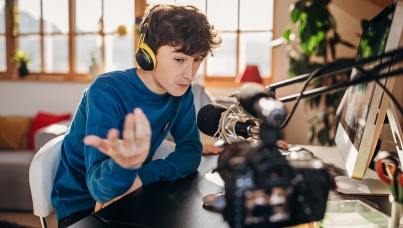Importance of Digital Terrestrial Television and Broadcast Radio
On 10th August 2021 a fire was reported at the Bilsdale mast operated by Arqiva. The mast suffered serious damage, resulting in a loss of Freeview radio and television signals to more than 600,000 households in the North East of England and North Yorkshire. As a result, Arqiva partnered with Ipsos to better understand the impact and importance of broadcast television and radio. The research focused on two important areas: the first being an exploration of the Great Britain population and the second focused on a deep dive into households in the affected North East and North Yorkshire area.
Broadcast television and radio services are heavily relied upon and highly valued in GB
Our survey of adults in Great Britain found that, over half (56%) had watched Freeview via an aerial in the past year and 43% choose to watch weekly. Our survey also highlighted that in the past year, 87% of people have listened to radio at home or in the car, with a much smaller group listening online (42%). The majority of adults in Great Britain listen to radio each week (76%).
Audiences in rural areas are heavier users of broadcast services and rely on these more. Broadcast TV and radio are also highly more valued by people who often do not have the means or choice to access alternatives – including the elderly and those living alone, lower social grades and non-working population.
Most people view the continued provision of free-to-view broadcast services into the future as important if not essential, with 73% of adults saying this is true for broadcast TV and 84% for radio. People recognise the importance of broadcast services that are free-to-view and not reliant on superfast internet speeds being available across Great Britain. Affordability and willingness to pay are key to barriers to the take-up of alternative services, with 13% of adults saying they cannot afford paid-for TV services. Despite improvement in connectivity, 7% of adults suggested their internet connection is not good enough to watch TV shows or listen to the radio online. Notably, 16% who watched Freeview in the past year also consider themselves to have a skill gap which is a barrier to accessing online content.
9 in 10 GB adults believe broadcast services should be continually supported
90% of adults across Great Britain believe that Freeview and broadcast radio services should be continually supported. For those affected by the Bilsdale incident the importance of the continued provision of broadcast services was even more pronounced. 95% in Bilsdale suggested these services should continue to be supported, peaking at 97% amongst those who lost TV services and 98% who lost radio. Furthermore, the majority of adults across Great Britain indicate that government and local MPs (85%), and the BBC (83%) should continue to play active roles to support these services, a view more strongly held by those impacted by the loss.
Our research indicates that people believe a hypothetical loss of broadcast services would have a significant impact, but this imagined impact is still underestimated when compared to the experience of an actual loss of services.
Following the Bilsdale mast fire, 83% who lost all TV channels and 73% who lost radio services felt personally affected in some way. There was a stronger, negative emotional reaction than people unaffected across Great Britain would imagine. Just over three quarters (77%) of those who lost all their TV channels stopped or reduced their viewing of TV channels, and 65% of people whose radio services were affected reduced or stopped listening to broadcast radio indicating that many people did not transition their TV and radio consumption over to alternative platforms.
New, paid-for alternative services were taken up to a lesser degree than expected. Whilst 47% of people across Great Britain said they would buy new equipment or services to access TV if they lost broadcast services, only 20% of those affected in Bilsdale did. While 20% of people in Great Britain suggested they would sign up to a new music streaming site in the absence of broadcast radio, only 9% in Bilsdale who were affected did.
- For further information, download the full report (PDF)
- Download the report summary
Technical Note
On behalf of Arqiva, Ipsos interviewed a quota sample of 2005 participants aged 18+ years in Great Britain via their telephone Omnibus for the national representative exploration, between 26th January – 9th February 2022. Quotas were set by age, gender, working status and region. Data was weighted to represent the GB population by age, social grade, region and working status within the gender variable and additional profiles on tenure and ethnicity using PAMCo data.
The deep dive into households affected in the North East area was also interviewed via telephone Omnibus, with an additional 1,001 participants aged 18+ living in postcodes most likely to have been serviced by the Bilsdale transmitter. Interviews were conducted between 26th January – 4th March 2022. All data was weighted to represent the known population of these audiences by age and gender.
For further information, read the full technical note in the appendix.






